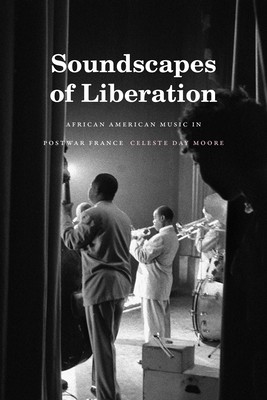
- We will send in 10–14 business days.
- Author: Celeste Day Moore
- Publisher: Duke University Press
- Year: 2021
- Pages: 312
- ISBN-10: 1478013761
- ISBN-13: 9781478013761
- Format: 15.2 x 22.9 x 1.9 cm, kieti viršeliai
- Language: English
- SAVE -10% with code: EXTRA
Reviews
Description
In Soundscapes of Liberation, Celeste Day Moore traces the popularization of African American music in postwar France, where it signaled new forms of power and protest. Moore surveys a wide range of musical genres, soundscapes, and media: the US military's wartime records and radio programs; the French record industry's catalogs of blues, jazz, and R&B recordings; the translations of jazz memoirs; a provincial choir specializing in spirituals; and US State Department-produced radio programs that broadcast jazz and gospel across the French empire. In each of these contexts, individual intermediaries such as educators, producers, writers, and radio deejays imbued African American music with new meaning, value, and political power. Their work resonated among diverse Francophone audiences and transformed the lives and labor of many African American musicians, who found financial and personal success as well as discrimination in France. By showing how the popularity of African American music was intertwined with contemporary structures of racism and imperialism, Moore demonstrates this music's centrality to postwar France and the convergence of decolonization, the expanding globalized economy, the Cold War, and worldwide liberation movements.
EXTRA 10 % discount with code: EXTRA
The promotion ends in 23d.19:51:40
The discount code is valid when purchasing from 10 €. Discounts do not stack.
- Author: Celeste Day Moore
- Publisher: Duke University Press
- Year: 2021
- Pages: 312
- ISBN-10: 1478013761
- ISBN-13: 9781478013761
- Format: 15.2 x 22.9 x 1.9 cm, kieti viršeliai
- Language: English English
In Soundscapes of Liberation, Celeste Day Moore traces the popularization of African American music in postwar France, where it signaled new forms of power and protest. Moore surveys a wide range of musical genres, soundscapes, and media: the US military's wartime records and radio programs; the French record industry's catalogs of blues, jazz, and R&B recordings; the translations of jazz memoirs; a provincial choir specializing in spirituals; and US State Department-produced radio programs that broadcast jazz and gospel across the French empire. In each of these contexts, individual intermediaries such as educators, producers, writers, and radio deejays imbued African American music with new meaning, value, and political power. Their work resonated among diverse Francophone audiences and transformed the lives and labor of many African American musicians, who found financial and personal success as well as discrimination in France. By showing how the popularity of African American music was intertwined with contemporary structures of racism and imperialism, Moore demonstrates this music's centrality to postwar France and the convergence of decolonization, the expanding globalized economy, the Cold War, and worldwide liberation movements.


Reviews